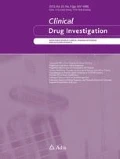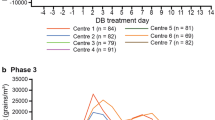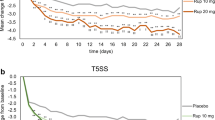Abstract
Background and Objective: Allergic rhinitis (AR) and chronic urticaria (CU) are common diseases with symptoms that impair quality of life. Second-generation antihistamines (e.g. cetirizine, desloratadine, fexofenadine, loratadine and mizolastine) are recommended first-line treatment for both conditions; however, studies of clinically relevant differences among these agents are lacking. The aim of this investigation was to evaluate the safety, tolerability and efficacy of desloratadine 5mg once daily in four post-marketing surveillance studies in subjects with seasonal AR (SAR) or chronic idiopathic urticaria (CIU) in real-world clinical practice settings.
Methods: This programme of prospective surveillance studies was conducted in Germany between February 2001 and March 2002 in allergy; dermatology; ear, nose and throat; or general practice settings. Subjects (total number 77 880) were aged ≥12 years and met the requirements for treatment of SAR or CIU with desloratadine as outlined in the package insert. All subjects received oral desloratadine 5 mg once daily for a mean duration of up to 40.4 days. Adverse events (AEs) were reported throughout the studies; serious AEs were recorded for up to 30 days after treatment. Investigators and subjects both rated tolerability at the end of treatment. Symptom severity and sleep and daily activity impairment were evaluated at baseline and after treatment using 4-point scales (0 = none; 1=mild; 2 = moderate; 3 = severe). A post hoc subanalysis assessed desloratadine efficacy and onset of symptom relief in subjects who had received monotherapy with another second-generation antihistamine.
Results: A total of 386 AEs were reported by 287 subjects (0.37%) in the four studies. The most commonly reported treatment-related AEs were fatigue (0.07%), headache (0.07%), dry mouth (0.04%) and nausea (0.03%). Tolerability was rated as excellent/good by 99.1% of investigators and 98.5% of subjects. Desloratadine therapy significantly reduced nasal and ocular symptom severity, itching and wheals, and sleep and activity disruption (p<0.0001), as indicated by a reduction in mean total and individual symptom scores, and reported impairment of sleep and daily activities. The efficacy of desloratadine was rated as significantly greater by 59.4–88.0% of subjects who had previously received monotherapy with cetirizine, fexofenadine,loratadine or mizolastine (sp<0.01 for all). The percentage of subjects who rated onset of symptom relief with desloratadine as faster than previous treatment ranged from 51.6% to 82.4%.]
Conclusion: Desloratadine was safe, well tolerated and efficacious in this series of surveillance studies. A post hoc analysis of subjects who had received previous monotherapy with a second-generation antihistamine found that most subjects rated efficacy as higher than their previous treatment, with a faster onset of symptom relief.








Similar content being viewed by others
References
Janson C, Anto J, Burney P, et al., on behalf of the European Community Respiratory Health Survey II. The European Community Respiratory Health Survey: what are the main results so far? Eur Respir J} 2001} Sep; 18(3)}: 598–611
Schoenwetter WF, Dupclay Jr L, Appajosyula S, et al. Economic impact and quality-of-life burden of allergic rhinitis. Curr Med Res Opin 2004 Mar; 20(3): 305–17
Fineman SM. The burden of allergic rhinitis: beyond dollars and cents. Ann Allergy Asthma Immunol 2002 Apr; 88(4 Suppl. 1): 2–7
Crystal-Peters J, Crown WH, Goetzel RZ, et al. The cost of productivity losses associated with allergic rhinitis. Am J Manag Care 2000 Mar; 6(3): 373–8
Thompson AK, Juniper E, Meltzer EO. Quality of life in patients with allergic rhinitis. Ann Allergy Asthma Immunol 2000 Nov; 85(5): 338–47
Simons FE. Learning impairment and allergic rhinitis. Allergy Asthma Proc 1996; 17: 185–9
Maurer M, Zuberbier T. Undertreatment of rhinitis symptoms in Europe: findings from a cross-sectional questionnaire survey. Allergy 2007 Sep; 62(9): 1057–63
Greaves MW. Chronic idiopathic urticaria. Curr Opin Allergy Clin Immunol 2003 Oct; 3(5): 363–8
O’Donnell BF, Lawlor F, Simpson J, et al. The impact of chronic urticaria on the quality of life. Br J Dermatol 1997 Feb; 136(2): 197–201
Engin B, Uguz F, Yilmaz E, et al. The levels of depression, anxiety and quality of life in patients with chronic idiopathic urticaria. J Eur Acad Dermatol Venereol 2008 Jan; 22(1): 36–40
Özkan M, Oflaz SB, Kocaman N, et al. Psychiatric morbidity and quality of life in patients with chronic idiopathic urticaria. Ann Allergy Asthma Immunol 2007 Jul; 99(1): 29–33
Staubach P, Eckhardt-Henn A, Dechene M, et al. Quality of life in patients with chronic urticaria is differentially impaired and determined by psychiatric comorbidity. Br J Dermatol 2006 Feb; 154(2): 294–8
Baiardini I, Giardini A, Pasquali M, et al. Quality of life and patients’ satisfaction in chronic urticaria and respiratory allergy. Allergy 2003; 58: 621–3
Zuberbier T. Urticaria. Allergy 2003 Dec; 58(12): 1224–34
van Cauwenberge P, Bachert C, Passalacqua G, et al. Consensus statement on the treatment of allergic rhinitis: European Academy of Allergology and Clinical Immunology. Allergy 2000 Feb; 55(2): 116–34
Salmun LM. Antihistamines in late-phase clinical development for allergic disease. Expert Opin Investig Drugs 2002 Feb; 11(2): 259–73
Takahashi H, Ishida-Yamamoto A, Iizuka H. Effects of bepotastine, cetirizine, fexofenadine, and olopatadine on histamine-induced wheal-and flare-response, sedation, and psychomotor performance. Clin Exp Dermatol 2004 Sep; 29(5): 526–32
Murdoch D, Goa KL, Keam SJ. Desloratadine: an update of its efficacy in the management of allergic disorders. Drugs 2003; 63(19): 2051–77
Simons FE, Prenner BM, Finn Jr A, for the Desloratadine Study Group. Efficacy and safety of desloratadine in the treatment of perennial allergic rhinitis. J Allergy Clin Immunol} 2003} Mar; 111(3)}: 617–22
Howarth PH, Stern MA, Roi L, et al. Double-blind, placebo-controlled study comparing the efficacy and safety of fexofenadine hydrochloride (120 and 180mg once daily) and cetirizine in seasonal allergic rhinitis. J Allergy Clin Immunol 1999 Nov; 104(5): 927–33
Spaeth J, Klimek L, Mösges R. Sedation in allergic rhinitis is caused by the condition and not by antihistamine treatment. Allergy 1996 Dec; 51(12): 893–906
Rosenzweig P, Thebault JJ, Caplain H, et al. Pharmaco-dynamics and pharmacokinetics of mizolastine (SL 85.0324), a new nonsedative H1-antihistamine. Ann Allergy 1992 Aug; 69(2): 135–9
Allegra® (fexofenadine hydrochloride) prescribing information, sanofi-aventis U.S. LLC, Bridgewater (NJ), 2007
Bousquet J, Khaltaev N, Cruz AA, et al. Allergic Rhinitis and its Impact on Asthma (ARIA) 2008 update (in collaboration with the World Health Organization, GA2LEN and AllerGen). Allergy 2008 Apr; 63Suppl. 86: 8–160
Scadding GK, Durham SR, Mirakian R, et al. BSACI guidelines for the management of allergic and non-allergic rhinitis. Clin Exp Allergy 2008 Jan; 38(1): 19–42
Zuberbier T, Bindslev-Jensen C, Canonica W, et al. EAACI/GA2LEN/EDF guideline: management of urticaria. Allergy 2006 Mar; 61(3): 321–31
Canonica GW, Tarantini F, Compalati E, et al. Efficacy of desloratadine in the treatment of allergic rhinitis: a meta-analysis of randomized, double-blind, controlled trials. Allergy 2007 Apr; 62(4): 359–66
Bachert C, Virchow CJ, Plenker A. Desloratadine in the treatment of seasonal allergic rhinitis: results of a large observational study. Clin Drug Invest 2002; 22Suppl. 2: 43–52
Augustin M, Ehrle S. Safety and efficacy of desloratadine in chronic idiopathic urticaria in clinical practice: an observational study of 9246 patients. J Eur Acad Dermatol Venereol 2009 Mar; 23(3): 292–9
Bachert C, Keith P, Mullol J, for the ACCEPT1 Investigators. Desloratadine significantly reduces nasal congestion and other individual symptoms scores in subjects with intermittent allergic rhinitis: results of the ACCEPT1 study in collaboration with GA2LEN [abstract 1760]. Allergy} 2008}; 63Suppl. 88}
Zuberbier T, Sussman G, van Cauwenberge P, et al., for the ACCEPT1 Investigators. Desloratadine significantly reduces total symptoms scores in subjects with intermittent allergic rhinitis: results of the ACCEPT1 study in collaboration with GA2LEN [abstract 1744]. Allergy} 2008}; 63Suppl. 88}
Pradalier A, Neukirch C, Dreyfus I, et al. Desloratadine improves quality of life and symptom severity in patients with allergic rhinitis. Allergy 2007 Nov; 62(11): 1331–4
Kim K, Sussman G, Hébert J, et al. Desloratadine therapy for symptoms associated with perennial allergic rhinitis. Ann Allergy Asthma Immunol 2006 Mar; 96(3): 460–5
Meltzer E. Quality of life in adults and children with allergic rhinitis. J Allergy Clin Immunol 2001 Jul; 108(1 Suppl.): S45–53
Meltzer EO, Jalowayski AA, Vogt K, et al. Effect of desloratadine therapy on symptom scores and measures of nasal patency in seasonal allergic rhinitis: results of a single-center, placebo-controlled trial. Ann Allergy Asthma Immunol 2006 Feb; 96(2): 363–8
Berger WE, Schenkel EJ, Mansfield LE, and the Desloratadine Study Group. Safety and efficacy of desloratadine 5 mg in asthma patients with seasonal allergic rhinitis and nasal congestion. Ann Allergy Asthma Immunol} 2002} Nov; 89(5)}: 485–91
Bachert C. Decongestant efficacy of desloratadine in patients with seasonal allergic rhinitis. Allergy 2001; 56Suppl. 65: 14–20
Nayak AS, Schenkel E. Desloratadine reduces nasal congestion in patients with intermittent allergic rhinitis. Allergy 2001 Nov; 56(11): 1077–80
Ortonne JP, Grob JJ, Auquier P, et al. Efficacy and safety of desloratadine in adults with chronic idiopathic urticaria: a randomized, double-blind, placebo-controlled, multicenter trial. Am J Clin Dermatol 2007; 8(1): 37–42
Monroe E, Finn A, Patel P, et al. Efficacy and safety of desloratadine 5 mg once daily in the treatment of chronic idiopathic urticaria: a double-blind, randomized, placebo-controlled trial. J Am Acad Dermatol 2003 Apr; 48(4): 535–41
Ring J, Hein R, Gauger A, et al., and the Desloratadine Study Group. Once-daily desloratadine improves the signs and symptoms of chronic idiopathic urticaria: a randomized, double-blind, placebo-controlled study. Int J Dermatol} 2001} Jan; 40(1)}: 72–6
Magerl M, Ehrle S, Maurer M. Effect of desloratadine on symptoms and quality of life in chronic idiopathic urticaria: results of a clinical practice study in Germany [abstract]. Ann Allergy Asthma Immunol 2008; 100(S1): A95
Shedden A, Iezzoni D. Congestion and its impact on sleep in individuals with allergic rhinitis. Presented at the XXV Congress of the European Academy of Allergology and Clinical Immunology; 2006 Jun 10–14; Vienna
Shedden A. Impact of nasal congestion on quality of life and work productivity in allergic rhinitis: findings from a large online survey. Treat Respir Med 2005; 4(6): 439–46
Bousquet J, Cheema A. Desloratadine therapy significantly improves quality of life and decreases impairment of daily activities and sleep in subjects with persistent allergic rhinitis: ACCEPT-2 study in collaboration with GA2LEN [abstract]. Ann Allergy Asthma Immunol 2009; 102: A120
Bousquet J, Zuberbier T, van Cauwenberge P, et al. Desloratadine improves disease-specific quality of life and reduced symptom burden measured with a novel visual analog scale in patients with intermittent allergic rhinitis: results of the ACCEPT1 study in collaboration with GA2LEN [abstract]. Allergy 2008; 63Suppl. 88: 633. A1759
Grob J-J, Auquier P, Ortonne J-P, et al. How to prescribe antihistamines for chronic idiopathic urticaria: desloratadine daily vs PRN and quality of life. Allergy 2009 Apr; 64(4): 605–12
Grob JJ, Auquier P, Dreyfus I, et al. Quality of life in adults with chronic idiopathic urticaria receiving desloratadine: a randomized, double-blind, multicentre, placebo-controlled study. J Eur Acad Dermatol Venereol 2008 Apr; 22(4): 87–93
Kim H, Lynde C. Impact of desloratadine on symptoms and quality of life in subjects with chronic idiopathic urticaria: a multicenter, practice-based study. Arch Drug Info 2008 Sep; 1(2): 63–9
Lachapelle JM, Decroix J, Henrijean A, et al. Desloratadine 5 mg once daily improves the quality of life of patients with chronic idiopathic urticaria. J Eur Acad Dermatol Venereol 2006 Mar; 20(3): 288–92
Seidenari S, Cirillo A, Amoroso S, et al. Desloratadine 5mg once daily improves quality of life in chronic idiopathic urticaria. G Ital Dermatol Venereol 2006; 141: 207–14
Day JH, Briscoe MP, Rafeiro E, et al. Comparative efficacy of cetirizine and fexofenadine for seasonal allergic rhinitis, 5–12 hours postdose, in the environmental exposure unit. Allergy Asthma Proc 2005 Jul–Aug; 26(4): 275–82
Day JH, Briscoe MP, Rafeiro E, et al. Randomized double-blind comparison of cetirizine and fexofenadine after pollen challenge in the Environmental Exposure Unit: duration of effect in subjects with seasonal allergic rhinitis. Allergy Asthma Proc 2004 Jan–Feb; 25(1): 59–68
Day JH, Briscoe MP, Rafeiro E, et al. Comparative clinical efficacy, onset and duration of action of levocetirizine and desloratadine for symptoms of seasonal allergic rhinitis in subjects evaluated in the Environmental Exposure Unit (EEU). Int J Clin Pract 2004 Feb; 58(2): 109–8
Lee DK, Gardiner M, Haggart K, et al. Comparative effects of desloratadine, fexofenadine, and levocetirizine on nasal adenosine monophosphate challenge in patients with perennial allergic rhinitis. Clin Exp Allergy 2004 Apr; 34(4): 650–3
Hampel F, Ratner P, Mansfield L. Fexofenadine hydrochloride, 180mg, exhibits equivalent efficacy to cetirizine, 10 mg, with less drowsiness in patients with moderate-to-severe seasonal allergic rhinitis. Ann Allergy Asthma Immunol 2003 Oct; 91(4): 354–61
Wilson AM, Haggart K, Sims EJ, et al. Effects of fexofenadine and desloratadine on subjective and objective measures of nasal congestion in seasonal allergic rhinitis. Clin Exp Allergy 2002 Oct; 32(10): 1504–9
Nunes C, Ladeira S. Double-blind study of cetirizine and loratadine versus placebo in patients with allergic rhinitis. J Investig Allergol Clin Immunol 2000 Jan-Feb; 10(1): 20–3
Prenner BM, Capan D, Harris AG. Efficacy and tolerability of loratadine versus fexofenadine in the treatment of seasonal allergic rhinitis: a double-blind comparison with crossover treatment of nonresponders. Clin Ther 2000; 22: 760–9
Acknowledgements
Funding for the programme of four studies was provided by Essex Pharma GmbH. Editorial assistance was provided by Karl Torbey, MD, and Patricia C. Abramo of AdelphiEden Health Communications and funded by Essex Pharma GmbH. The authors did not receive any funding for their contribution to this review. Prof. Claus Bachert is or recently was a speaker for Schering-Plough, GlaxoSmithKline, Faes Farma, UCB Pharma and Uriach Pharma, and has received study funding from Schering-Plough and Glaxo SmithKline. Prof. Marcus Maurer is or recently was an investigator, speaker and/or advisor for Almirall Hermal, Bayer Schering Pharma, Biofrontera, Essex Pharma, JADO Technologies, Jerini AG, Novartis, Schering-Plough, Symbiopharm, UCB Pharma and Uriach Pharma.
Author information
Authors and Affiliations
Corresponding author
Rights and permissions
About this article
Cite this article
Bachert, C., Maurer, M. Safety and Efficacy of Desloratadine in Subjects with Seasonal Allergic Rhinitis or Chronic Urticaria. Clin. Drug Investig. 30, 109–122 (2010). https://doi.org/10.2165/11530930-000000000-00000
Published:
Issue Date:
DOI: https://doi.org/10.2165/11530930-000000000-00000




